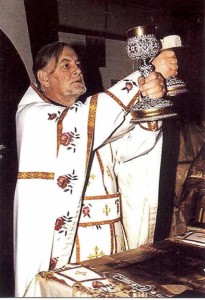Reader Dave sent the following quote from Fr. Alexander Schmemann’s book Of Water and the Spirit: A Liturgical Study of Baptism. I find it interesting that he made the connection between liturgical strangeness and preparation. This is because, as anyone in formation in our monastery will tell you, I harp on the theme of preparation as integral to the spiritual and liturgical life. Schmemann:
We must realize first of all that preparation is a constant and essential aspect of the Church’s worship as a whole. It is impossible to enter into the spirit of the liturgy, to understand its meaning and truly to participate in it without first understanding that it is built primarily on the double rhythm of preparation and fulfillment, and that this rhythm is essential to the Church’s liturgy because it reveals and indeed fulfills the double nature and function of the Church herself.
On the one hand the Church herself is preparation: she “prepares” us for life eternal. Thus her function is to transform our whole life into preparation. By her preaching, doctrine and prayer she constantly reveals to us that the ultimate “value” which gives meaning and direction to our lives is at the “end,” is “to come,” is to be hoped for, expected, anticipated. And without this basic dimension of “preparation” there simply is no Christianity and no Church. Thus the liturgy of the Church is always and primarily a preparation: it always points and tends beyond itself, beyond the present, and its function is to make us enter into that preparation and thus transform our life by referring it to its fulfillment in the Kingdom of God.
Yet, on the other hand, the Church is also and essentially fulfillment. The events which gave her birth and which constitute the very source of her faith and life have taken place. Christ has come. In Him man was deified and has ascended to heaven. The Holy Spirit has come and His coming has inaugurated the Kingdom of God. Grace has been given and the Church truly is “heaven on earth,” for in her we have access to Christ’s table in His Kingdom. We have received the Holy Spirit and can partake, here and now, of the new life and be in communion with God.
One of the things we insist on when men enter our monastery is that they do lectio divina on the Propers of the Liturgy. Why? Because this becomes their personal (and our communal) preparation for the Divine Liturgy. Without this kind of intensive, and quite frankly often mundane, preparation, many aspects of the liturgy will simply go over our heads. This is not because the liturgy is too difficult, intellectual, or aesthetically elitist. It is because the liturgy comes to us from the future, from the end of time, from heaven, and we begin this encounter as persons in time and in the world. The liturgy is our training to be in the world but not of it, in time but eschatological, citizens of heaven still on pilgrimage.We will better realize the fulfillment of time and the cosmos to the extent that we prepare for the work of the liturgy. All of us are invited to do this, at whatever level is appropriate to our place in the Church, and we all benefit each other to the degree that we become new persons, that we “partake, here and now, of the new life.”
